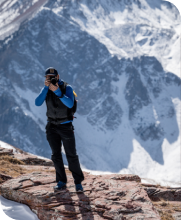Like all my photography peers working at Nat Geo, I started at the bottom. I worked for newspapers and small magazines, and I did a wide range of photography and writing freelance jobs for years, honing my skills as a storyteller. Throughout the process, I wrote hundreds of proposals, only to hear “no” enough times to pave more determination.
So I kept at it and eventually teamed up with a small group of aviation enthusiasts that had produced a Nat Geo story and film about a famous historical flight. I volunteered for the group for two years as I worked other jobs (photography, writing, carpentry) and eventually confirmed my role as the expedition photographer. After securing enough sponsors, we flew an exact replica WWI Vickers Vimy biplane from London to Cape Town over 58 days (top speed 65 mph).
National Geographic had said no to the story prior our departure but became interested as we successfully completed the journey, flight by flight, despite a crash and many other misadventures. I documented it all — the highs and lows — and maxed out two credit cards in the process (our sponsorships were light). National Geographic decided to buy the story afterwards, and since then I’ve worked for many of the organization’s media outlets — print, TV, speaking, workshops etc., spanning 20 years. Each new proposal and story has come with as many challenges and hurdles as that first adventure; a key component is persistence.
Work for others first. Craft your eye and skill as a storyteller.
I love rivers—I grew up on them. I like fishing, I like boating. I like desert landscapes. I like mountain landscapes. I like wild places.
After years of documenting overseas, I was amazed that the story of my backyard river, the Colorado, wasn’t being told in a broader spectrum. It made me realize that our rivers are the arteries of the planet; they’re our lifelines. We can live without oil with some big, drastic changes, but we can’t live without fresh water. To see these stories not being focused on made me think I should be one of the people that tries to change that, so I’ve just tried to focus my attention in that arena.
I was asked to go give a talk about my Colorado River project and water at the Grand Canyon by the national park. While I was there, I was invited to walk down into the canyon and stay at one of the ranger huts down at the bottom. I had the good fortune to hike with some long-time Grand Canyon rangers, and they started telling me about some of the issues the Grand Canyon is facing and some of the development pressures that exist. It made me think, I should come back and look at that.
I reached out to a friend of mine who’s written a book on the Grand Canyon, Kevin Fedarko, and we started talking. I got this crazy idea that maybe we should just walk the length of the park.
Very few people have walked the length of the Grand Canyon. It’s really an extreme hike, and it became something of a personal challenge, but really it was a way to talk about the park itself and what’s happening there. The issues in and around the Grand Canyon are really happening on all sides of the park and all four points of the compass.
Find a story that you’re passionate about and shoot for something that’s important to you. It sounds cliché, but follow your heart, and the money will follow. This is a tough way to make a living, but if you tell a story you care about and you’re passionate about, the passion will show through in the work. And that will open doors and ways to get the story out there more. Sometimes these stories may take years to do.
After years of working and telling other people’s stories for magazines, I finally just went and told what I thought was a personal story in my Colorado River book. That led me to film and to telling stories focused on water. And it’s also led me to a place that is more interesting, more enriching and more engaging than if I was just trying to get the next assignment—whatever that assignment may be.






